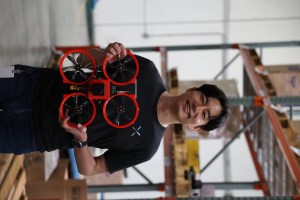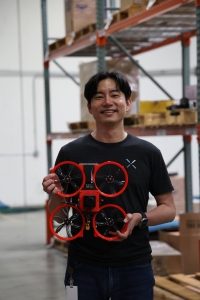
B Garage raises $20M for its warehouse inventory drones
B Garage, a San Jose-based startup building autonomous drones along with software to track warehouse inventory, said today that it has picked up $20 million in a Series A round of funding.
New investor LB Investment led the Series A funding with participation from Ignite Innovation Fund, Krossroad Partners and existing backer SoftBank Ventures Asia. The proceeds, which bring the total amount raised by B Garage to $30 million, will enable the outfit to further develop and commercialize its drones and grow its engineering and business teams.
The startup was founded in 2017 by Aiden Kim, a former software engineer at Oracle. Kim, who holds a PhD in aeronautics and astronautics from Stanford University, also previously participated in dog robot research at Stanford Artificial Intelligence Laboratory (SAIL), collaborating with Boston Dynamics for hardware development. (His team focused on creating artificial intelligence software for the dog robot research, Kim said.)
While studying for the doctoral program, Kim realized the lack of startups in the autonomous flight field, and he first came up with an idea in 2017 to build a company offering autonomous flight technology for drone manufacturers. After meeting industry experts in the U.S. in 2019, Kim shaped his plan to develop drones and management software for automated warehouse inventories. What he learned from the industry experts at the time was that industries like agriculture and logistics faced labor shortages, Kim told TechCrunch.
“[Most] B2B logistics warehouses in the U.S. are far from urban areas and face a severe labor shortage,” Kim said. “The autonomous drone technology could be highly suitable for B2B logistics warehouse inventory management.”
B Garage’s mission is to address the labor shortage issue in those sectors by utilizing artificial intelligence and autonomous technology, Kim said.
The company has worked on a proof-of-concept pilot test with Kenco Innovation Lab, a unit of Kenco Logistics, for the last few months. Now it is planning to deploy its drones to more than 10 select Kenco warehouses across the U.S. by the end of 2023. It is also working with Incheon Port Authority in South Korea, aiming to commence the project by the year-end.
Companies like Verity, Gather AI and Corvus Robotics have also raised funding for their inventory drones. B Garage has tried to set itself apart from its rivals with four features: full autonomy that covers multiple aisles, no additional infrastructure required, mapping-free operation and automatic battery swapping.
B Garage’s drone can “navigate through multiple aisles, providing comprehensive coverage of warehouse spaces,” Kim said, adding that many other drone solutions are limited to specific paths or single aisles.

Image Credits: CEO of B Garage, Aiden Kim
On top of that, users don’t need to integrate additional technology to operate drones with their warehouse infrastructure, so there are no extra charges. Competitors typically require an initial fee and ongoing operating costs for installing markers or beacons (indoor GPS) throughout the logistics warehouse and regularly updating the mapping, the CEO explained.
Another differentiator, the startup claims, is the automatic battery swapping facility.
“Our drones are equipped with advanced battery technology that enables efficient batter replacement,” Kim continued. If the drone’s battery runs out, the drone automatically returns to its dedicated battery swapping station, which replaces the depleted battery with a fully charged one from its inventory of pre-charged batteries in a matter of minutes.
B Garage plans to continue enhancing its software solutions with the goal of integrating with its hardware to apply its technology to industries beyond logistics, such as defense and security, according to the company.
It also aims to introduce ground robots for inventory management, Kim said when asked about its plans. The ground robots will allow the startup to cater to a broader range of customers, providing comprehensive solutions for inventory management across various sectors, Kim explained.

